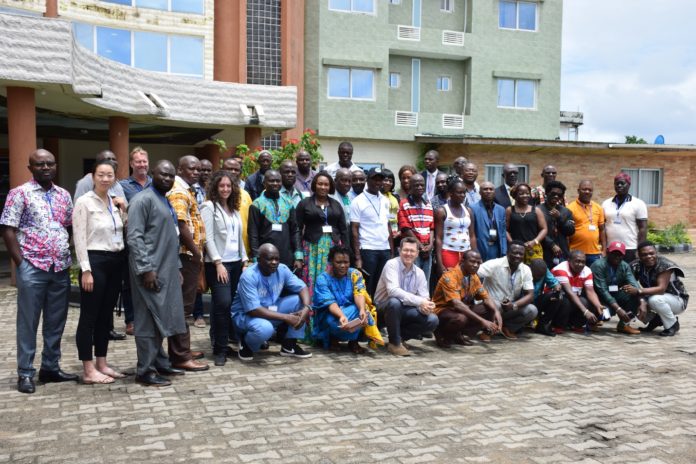By Joseph O. Sayon
Conservation news writer
A group of local and national media executives drawn from across Liberia, in collaboration with conservation partners working in the Mano River Union transboundary forest landscapes have concluded a three-day workshop in Monrovia intended to designed thoughtful ideas bordering on conservation messages a 24-episodes radio drama series.
The radio drama series comes at a time when the transboundary forest landscapes are being grossly undermined by the unscrupulous acts of poaching, illegal mining, wildlife and forest crimes.
The USAID funded project dubbed as very cardinal and timely is being implemented by the West Africa Biodiversity and Climate Change (WABICC).
Principally it aims at positively changing the mindset of the communities living in the Gola, Ziama-Wonegizi and Tai-Grebo-Krahn-Sapo Transboundary landscapes.
Essentially, the design and production of the radio dramas is being undertaken in the face of the ever increasing threats on the transboundary forest landscapes including wildlife and forest crimes-poaching, illegal mining, shifting cultivation being key.
Among other things, the participants identified key devastating threats including illegal mining, logging, poaching, shifting cultivation and other unlawful activities that continue to grossly undercut biodiversity regime in the MRU region thereby impeding regional social and economic lives of the people.
More prominently, the workshop provided the platform where WABiCC story and journey in the landscapes was shared by the facilitators, participants brainstormed on campaign strategies to boost listenership while monitoring and evaluation plan for the 24-epsodes drama series was developed, among others.
MRU welcomes drama series
In his opening statement the MRU Resident Coordinator Christine Jallah thanked the participants on behalf of MRU Secretary General Mrs. Mardina Wesseh and pledged MRU’s unflinching commitment in providing the necessary guidance in its capacity as a major stakeholder in the Mano River Union Basin.
“We would like to also acknowledge here that this is a process; not an event and will not be free of challenges. Yet, it’s important that the process of communication and dialoguing has started, and we appreciate the effort invested and the commitment exhibited thus far by our partners,” he emphasized in a brief but thoughtful statement.
He continued, “As we may all be aware the sub-region is endowed with vast resources, and several endangered species.
He added that in order to protect these resources (our National Park, endangered species) changing of attitudes, education, and a well plan communication strategy such as the use of drama could yield substantial benefits to our sub-region, sub-regional collaboration and the participation of citizens as stakeholders cannot be overemphasized.
In these collaborations, media institutions will play a major role in creating a content that speaks to the importance of practicing how citizens manage their landscape.
Local Leader urges FDA
In separate remark, the Chairman of the Community Forest Organizing Committee (CFOC) in Grand Cape Mount County, Mr. Jacob B. Fornorh thanked WABICC for the level of sensitization they continue to give communities in the sub-region aimed at conserving their forests.
Mr. Fornorh at the same time wants the Forestry Development Authority (FDA) in Liberia to apply all efforts to grant the people of his community the right to own their community forest in accordance with the law.
Fornor disclosed that since his community (Sokpo clan in Grand Cape Mount) applied to FDA for a community forest status last year they are yet to get positive result from FDA due to new moratoria on community forest in Liberia.
The workshop was facilitated by David Wood and Loretta Cheung of the PCI Media Head Office in New York, USA alongside Darius Barrolle and Fatmata Katta of PCI Media assigned to WABiCC program.






















